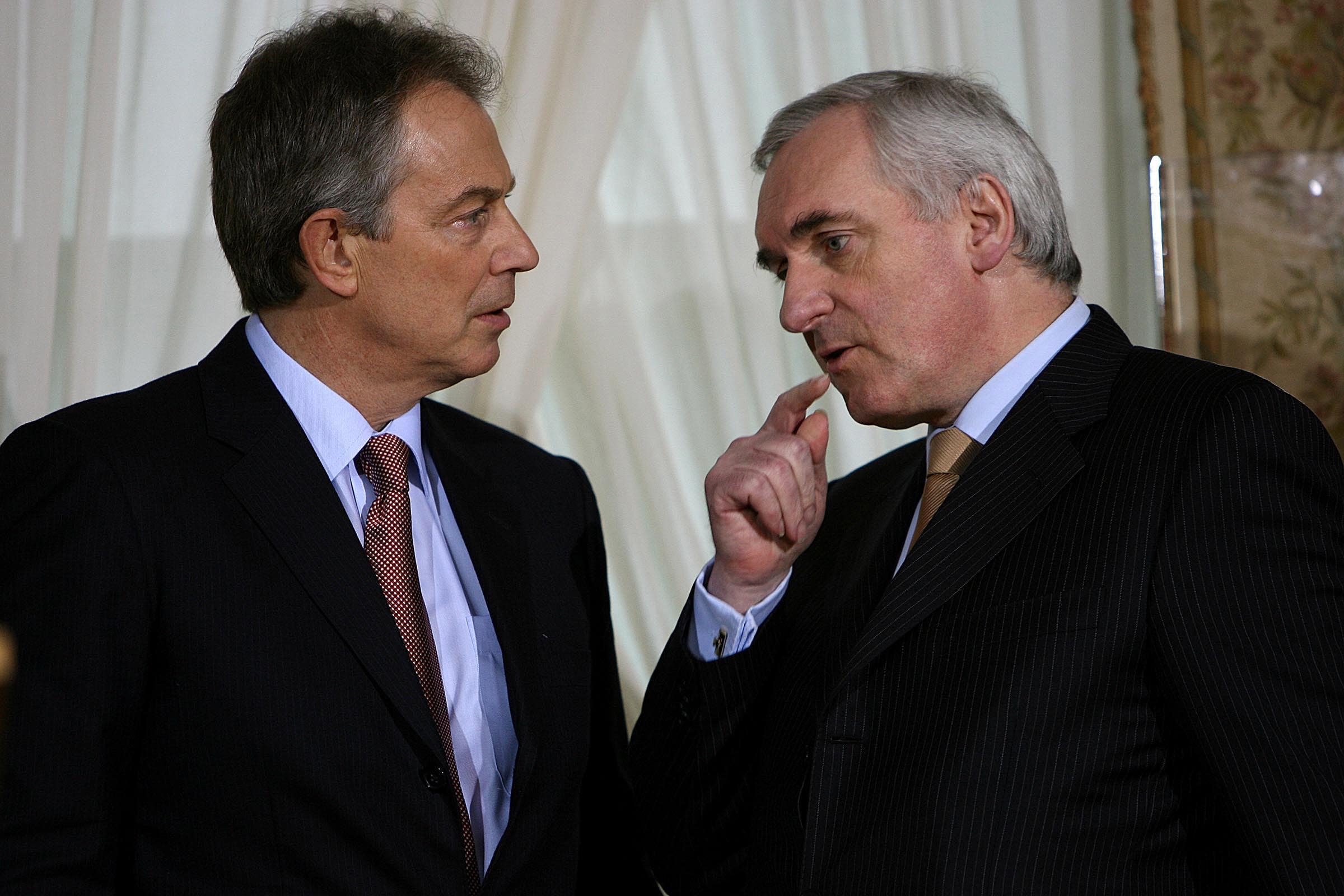Blair and Ahern hail Anglo-Irish partnership that helped land Good Friday accord
The former prime minister and taoiseach have reflected on the negotiations ahead of the 25th anniversary of the deal.

Sir Tony Blair and Bertie Ahern have hailed the spirit of Anglo-Irish teamwork and partnership that marked the high pressure negotiations that delivered Northern Ireland’s historic Good Friday Agreement.
Twenty-five years on from the intensive talks that produced the landmark accord in April 1998, the former UK and Irish prime ministers have reflected on their famously close working relationship.
While stressing the importance of the UK and Irish governments acting in lockstep, the ex British PM and Taoiseach credited the bravery of unionist and nationalist political leaders in Northern Ireland for striking the powersharing settlement that largely ended the Troubles.
In interviews with the PA news agency to mark the upcoming anniversary of the Good Friday deal, the political veterans, who both came to power in 1997, have recalled the highs and lows of the exhausting negotiation process one year later at Castle Buildings on the Stormont estate in Belfast.
“It’s amazing how fast the time has gone by,” said Sir Tony.
“It’s incredible to think it was 25 years ago that we were sitting for those days in Castle Buildings in Belfast trying to get the historic peace agreement agreed.”
The former Labour leader added: “When I look back on it, I think we took the most enormous risks in trying to do it.
“Because when I came to office, though John Major had done some really good work in sort of laying the foundations of a possible way forward, the fact is that it had broken down.
“We didn’t have an agreement when I came to Belfast to start that negotiation, the thing had collapsed effectively, completely.
“And then during the course of the days that followed, we had the agreement, then we lost it, and we had it again, then we lost it again, it was an extraordinary time. But somehow we kept going, and you know all the different leaders that I was working with, they showed real leadership in the end trying to bring it together and bring it off.”
Mr Ahern’s mother Julia died in final stages of the talks and the then-Fianna Fail leader left the negotiations to attend the funeral and returned as the process reached a crescendo.
“Bertie Ahern was an absolute rock throughout it,” said Sir Tony.
“Because quite apart from the fact he had to overcome a personal tragedy with the passing of his mother right at the outset of the negotiation, it’s also that he was both from Ireland’s history, understood Ireland’s history, understood the relationship between Ireland and Britain and all the issues that arose between the two, but could always rise above it and come to the level of the necessary commitment for the future.
“He was a great partner in the process.”
Mr Ahern said he began meeting with Sir Tony while they were both leaders of their respective parliaments’ oppositions in 1995 and 1996.
“We were looking to see how we could get back, Humpty Dumpty on the wall again,” he said.
“That’s what really led into us moving very quickly, we had pre-planned where we were going in ’97,” he added.
Mr Ahern said people living on the island of Ireland should be “eternally grateful” to the former UK prime minister.
“We got on really well, which was hugely positive,” he said.
“We trusted each other. We worked together as a team rather than British, Irish.”
Mr Ahern singled out Sir Tony’s time commitment to the negotiations as “extraordinary”.
He said while the Labour leader had established an international reputation and committed to a “huge agenda of reform” as a new prime minister in 1997, he put in “huge hours into helping to deal with the Irish situation”.
He said the prime minister regularly entered into “long sessions of two or three days at a time” in meetings at Chequers, No 10, Castle Buildings, Hillsborough Castle and other locations.
“People should be eternally grateful on this island for him,” added Mr Ahern.
Asked about Sir Tony’s comments that the agreement could not have happened without Mr Ahern, he said: “We were a team.
“We worked because we worked together and we didn’t let each other down.”
Reflecting on their relationship, Mr Ahern said: “We were ringing each other all the time, there were times I spoke to him every day, literally.
“In his 10 years and my 11 years in office, I wouldn’t say there was a period of more than 72 hours where we didn’t talk to each other.”
However, Mr Ahern emphasised that it was not just the two men involved and that it was an “inclusive process”.
“We had small teams of officials and then the other political parties,” he said.
“On Sundays, I used to ring the party leaders and have long chats with them, reviewing the briefs from officials. It was that ongoing dialogue.”
He said that then-US president Bill Clinton was also “there when we needed him”.





